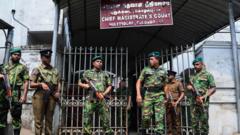The decision, arising from safety concerns, has ignited debate on immigration policy as conditions in Haiti deteriorate.
Trump Ends Deportation Protection for 500,000 Haitians Amid Crisis

Trump Ends Deportation Protection for 500,000 Haitians Amid Crisis
In a controversial move, the US government plans to terminate Temporary Protected Status for Haitian nationals.
The U.S. Department of Homeland Security has announced plans to end Temporary Protected Status (TPS) for approximately 500,000 Haitians currently residing in the United States, effective August 2025. This decision has come despite the escalating crisis in Haiti, where gang violence reportedly controls around 85% of the capital, Port-au-Prince, alongside a reported 1,000% increase in sexual violence against children over the past year, as highlighted by the United Nations.
Former President Donald Trump, who has been focused on reforming immigration policy since returning to office, signaled intentions for "mass deportations" and stricter immigration control. He previously made unsubstantiated claims during his campaign regarding undocumented Haitians engaging in bizarre behavior, which were dismissed as unfounded and racially charged by officials including National Security Council spokesman John Kirby.
TPS is a legal designation provided to citizens of countries facing extraordinary conditions that prevent safe return. It has been in effect for Haitians since a devastating earthquake in 2010. With the end of this status, those affected would not only lose their work permits but also face increased risks of deportation. In a parallel development, the administration's move also included plans to cease TPS for Venezuelans, although this is currently under legal scrutiny by advocacy groups.
The decision to end TPS has met with critical backlash. Democratic Congresswoman Ayanna Pressley condemned the action as "shameful," particularly in light of "unspeakable violence" plaguing Haiti. She emphasized that long-term residents in the U.S. are now at risk of being deported solely due to their nationality, which raises significant ethical and humanitarian concerns. Meanwhile, alarming statistics from the UN indicate that violence claimed the lives of over 5,600 individuals in Haiti last year, as families struggle for safety and basic needs under dire circumstances.
The end of Temporary Protected Status for Haitians will not only impact individuals and families at risk of deportation but could also shift the broader conversation around U.S. immigration policy amid ongoing humanitarian crises.
Former President Donald Trump, who has been focused on reforming immigration policy since returning to office, signaled intentions for "mass deportations" and stricter immigration control. He previously made unsubstantiated claims during his campaign regarding undocumented Haitians engaging in bizarre behavior, which were dismissed as unfounded and racially charged by officials including National Security Council spokesman John Kirby.
TPS is a legal designation provided to citizens of countries facing extraordinary conditions that prevent safe return. It has been in effect for Haitians since a devastating earthquake in 2010. With the end of this status, those affected would not only lose their work permits but also face increased risks of deportation. In a parallel development, the administration's move also included plans to cease TPS for Venezuelans, although this is currently under legal scrutiny by advocacy groups.
The decision to end TPS has met with critical backlash. Democratic Congresswoman Ayanna Pressley condemned the action as "shameful," particularly in light of "unspeakable violence" plaguing Haiti. She emphasized that long-term residents in the U.S. are now at risk of being deported solely due to their nationality, which raises significant ethical and humanitarian concerns. Meanwhile, alarming statistics from the UN indicate that violence claimed the lives of over 5,600 individuals in Haiti last year, as families struggle for safety and basic needs under dire circumstances.
The end of Temporary Protected Status for Haitians will not only impact individuals and families at risk of deportation but could also shift the broader conversation around U.S. immigration policy amid ongoing humanitarian crises.




















